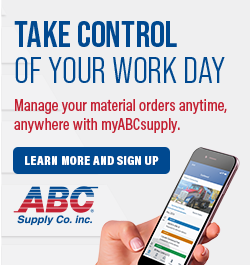Measuring noise and selecting proper hearing protection

By Cotney Consulting Group.
The importance of protective hearing goes beyond immediate safety concerns as contractors in the roofing industry are constantly at risk.
In roofing contracting, where power tools, heavy machinery and metal clanging against metal fill the air, protecting one's hearing is paramount. Roofing professionals are constantly exposed to high noise levels, which can lead to irreversible hearing damage if precautions aren't taken. In this article, we will explore the vital aspects of measuring noise and selecting appropriate hearing protection, ensuring the well-being of roofing workers and promoting a safe and productive work environment.
Measuring noise: A precise science
Understanding noise intensity in a roofing environment is the first step toward effective hearing protection. Accurate measurement is crucial, and roofing contractors can utilize various methods. Sound level meters, specialized phone applications and dosimetry devices are indispensable tools in this endeavor. Sound level meters provide real-time measurements, enabling contractors to identify areas with excessively high noise levels. Additionally, smartphone apps are designed to measure noise levels accurately, offering a convenient and cost-effective solution for on-site assessments. Dosimetry devices, worn by workers during their shifts, provide detailed data on their noise exposure throughout the day, aiding in the development of targeted protective measures.
Selecting the right hearing protection
Armed with precise noise measurements, selecting the appropriate hearing protection becomes a critical decision. Roofing professionals should prioritize hearing protection devices (HPDs) with adequate noise reduction ratings (NRR) matching the noise levels in their work environment. An NRR indicates the device's ability to reduce noise exposure, and choosing a rating that sufficiently lowers the noise level is essential. Comfort and worker acceptance are equally important factors. Uncomfortable or ill-fitting HPDs can discourage workers from wearing them consistently, jeopardizing their safety. Therefore, investing in ergonomically designed and customizable hearing protection solutions ensures long-term wearability and effectiveness.
Hearing conservation programs: Ensuring compliance and safety
Implementing a comprehensive hearing conservation program is not only a regulatory requirement but also a fundamental step in safeguarding the hearing health of roofing professionals. Such programs encompass training, medical surveillance and regular assessments. Training sessions educate workers about the risks associated with noise exposure, the proper usage of hearing protection and the importance of adhering to safety protocols. Medical surveillance involves regular hearing tests, ensuring early detection of any impairment and allowing timely intervention. Routine assessments of noise levels and the effectiveness of hearing protection devices are vital to continually adapt and optimize safety measures.
The importance of worker involvement and compliance
In roofing, a worker's active participation is instrumental in hearing protection initiatives' success. Workers must understand the risks associated with noise exposure and actively comply with safety guidelines. Encouraging a culture of awareness and responsibility can significantly enhance the effectiveness of hearing protection programs. Employers can involve workers in selecting hearing protection devices, considering their preferences and comfort. Additionally, providing ongoing education and reminders fosters a safety-conscious atmosphere, empowering workers to take charge of their well-being.
Conclusion: Preserving hearing health for a promising future
In the dynamic world of roofing contracting, where precision and focus are paramount, protecting the auditory senses of workers is non-negotiable. Measuring noise accurately, selecting appropriate hearing protection, implementing robust hearing conservation programs and fostering a culture of awareness are the cornerstones of a safe and thriving roofing workplace. By investing in these measures, roofing contractors comply with regulations and prioritize the health and longevity of their most valuable asset — their workforce. As the industry advances, embracing these practices ensures that roofing professionals continue to excel, contributing to a vibrant and secure future for all.
Learn more about Cotney Consulting Group in their Coffee Shop Directory or visit www.cotneyconsulting.com.





















Comments
Leave a Reply
Have an account? Login to leave a comment!
Sign In